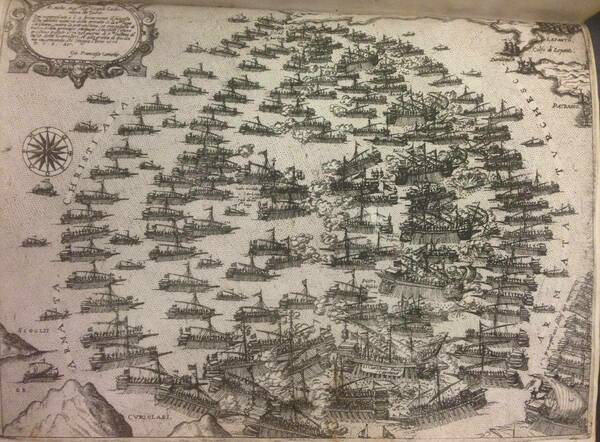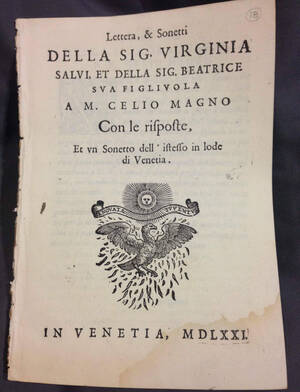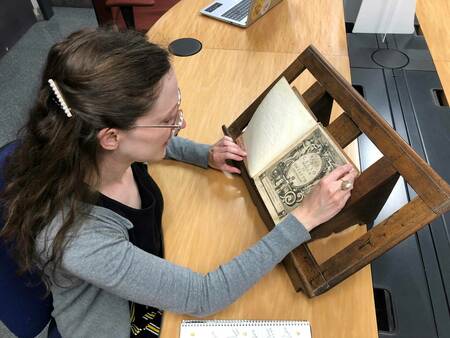
Katherine McKenna is a Rome Global Gateway short-term research fellow. In June 2023, she spent two weeks in Rome and one in Venice researching Sienese poet, academician, political firebrand and exile Virginia Martini Salvi and her participation in the Venetian response to the Battle of the Lepanto and the larger War of Cyprus of which it was a part in 1500s.

McKenna has studied abroad in Rome and is currently the National Endowment for the Humanities and Teagle Postdoctoral Scholar at the University of Notre Dame, where she teaches classes on the history of science and gender. Her research interests lie in the early modern world and include women as intellect in Italy and Europe, civic mythology, and contemporary print culture. Her work on these topics can be found in Early Modern Women: An Interdisciplinary Journal, The Routledge Encyclopedia of the Renaissance, and the forthcoming anthology Lucrezia Marinella’s Works, Reassessed (Classiques Garnier).
Since the days of undergraduate studies, McKenna was fascinated by women authors and their active involvement in civic and politics. In her book project entitled Fashioning Adria, Fashioning Femininity: Women Authors and the Pursuit of Civic Feminism in Renaissance Venice, McKenna explores the movement of secular women writers into print in Venice in conjunction with the contemporary civic crisis. Its chapters disrupt traditional historiographies of Renaissance state-making to reinstate secular Italian women as civic actors whose contributions to the book market and the discursive production of national mythology actively shaped contemporary civic life.
During her fellowship, McKenna researched Virginia Martini Salvi, who in October 1571, seized an opportunity to publish what would be her final printed work: a pair of bellicose sonnets in praise of contemporary Christendom and its heroes both military and intellectual. The northern Italian republic of Venice and its European allies were at war with the Ottoman Empire, and Catholic forces had recently extirpated the Turkish navy off the coast of Lepanto, Greece in a fight accurately described by contemporaries as the largest maritime conflict since the Battle of Actium.

“In the weeks and months that followed, hundreds of songs, poems, and orations commemorating the western forces’ victory rolled off the Venetian presses,” explains McKenna. “Salvi was quick to add her voice and that of her daughter Beatrice to the fray. In an era and a state that proscribed the bounds of ideal feminine life according to the dictum aut murus aut maritas (convent walls or marriage), political speech-making by a woman was a potentially fraught political enterprise.”
In Rome, Virginia Salvi lived in exile from approximately 1556 on, and in Rome, McKenna explored resources; the majority of Salvi’s extant poetic oeuvre predates the War of Cyprus and survives in manuscript form in Sienese state archives and in edited volumes held at libraries throughout Italy. Little evidence of her life post-exile has been sought for or recovered. Prospective repositories in Rome with collecting areas or finding aids that indicate the presence of records pertinent to Salvi include the Biblioteca Nazionale Centrale di Roma, the Biblioteca Angelina, which specializes in Italian literature and religious historical studies, and the Biblioteca Casatenese.
“The opportunity to work in Rome will also enable me to forge relationships with archivists at these institutions,”comments McKenna. “Because catalogs and finding aids for the manuscript collections of many Italian libraries have yet to be digitized or incorporated into online resources like the Cataloghi Storici Digitalizzati dell'ICCU, archivists remain the richest source of knowledge about the scope of a repository’s holdings.”
After the first two weeks in Rome, McKenna moved to Venice where she mainly worked at the Biblioteca Nazionale Marciana (BNM) and the Biblioteca del Museo Correr.
“While the outcome of an archival research trip cannot be fully known in advance, I am confident that the opportunity to conduct research in Italy for the first time since the COVID-19 pandemic will meaningfully advance my book project, and grow my academic network” explains McKenna.
Learn more about Research in Rome here.
Originally published by at rome.nd.edu on June 27, 2023.